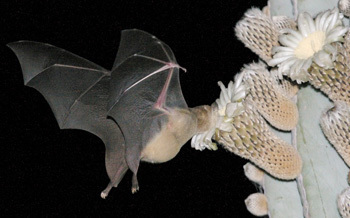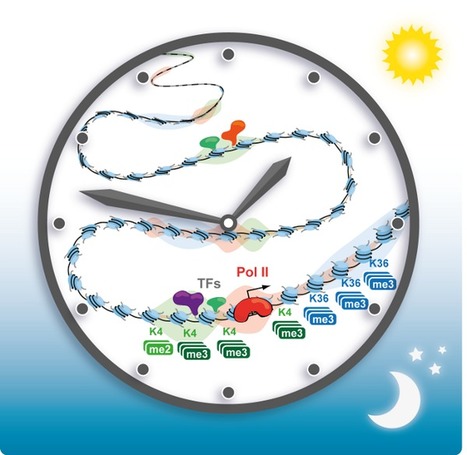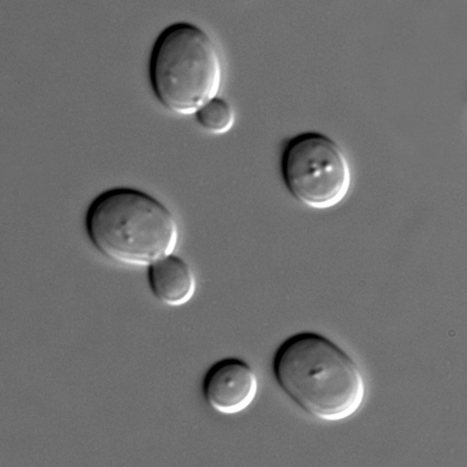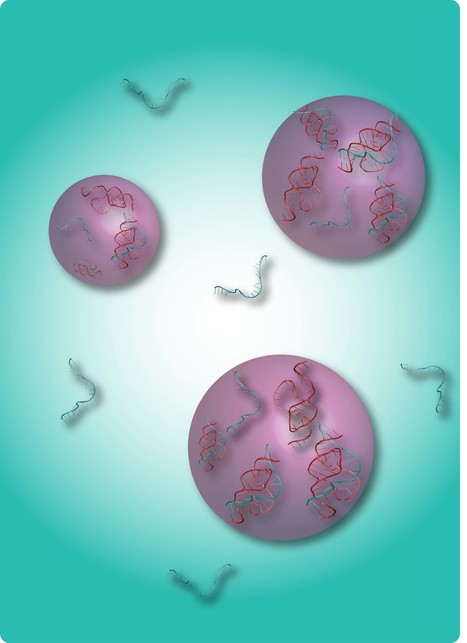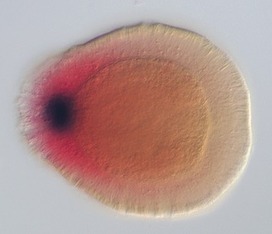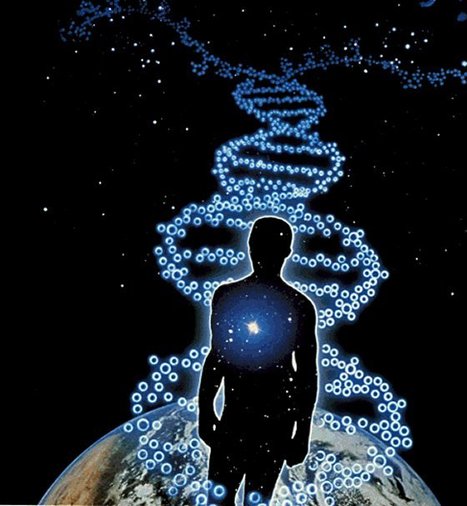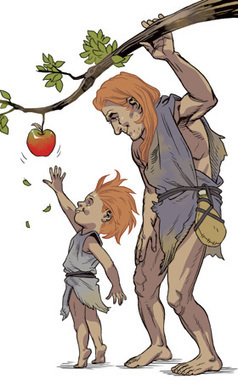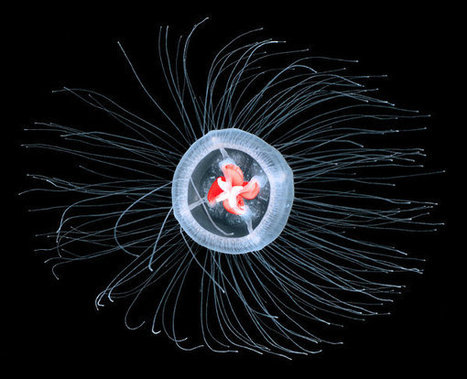Evolution skeptics argue that some biological structures, like the eye, are too complex for natural selection to explain. Biologists have proposed various ways that so-called "irreducibly complex" structures could emerge incrementally over time.
Get Started for FREE
Sign up with Facebook Sign up with X
I don't have a Facebook or a X account


 Your new post is loading... Your new post is loading...
 Your new post is loading... Your new post is loading...
Developmental Biology aims to understand the emergence of an organism from a single cell. It probes embryos with experiments in the hope of unravelling principles that govern the way they are made
Researchers at the University of California, San Diego School of Medicine and colleagues have proposed a new method that creates a computational model of the cell from large networks of gene and protein interactions, discovering how genes and proteins connect to form higher-level cellular machinery.
Surprising study of bats that pollinate cactus flowers sheds light on coevolution of plants and pollinators.
Daily rhythms in mRNA polymerase II transcription and histone modifications influence gene expression programs responsible for the temporal gating of liver physiology and metabolism in mammals.
Using genetic analyses, scientists have discovered that Northern European populations—including British, Scandinavians, French, and some Eastern Europeans—descend from a mixture of two very different ancestral populations, and one of these populations is related to Native Americans.
This is a newly revised 3 minute HD dramatic video choreographed to powerful music, which introduces the viewer to the wonder and miracle of cells.
Researchers have found that a single gene that can help explain what time of day you are likely to die.
Evolutionary biologists have long wondered why cooperation remains a viable survival strategy, since there will always be others who cheat. Now, MIT physicists have found a possible answer to this question: Among yeast, cooperative members of the population actually have a better chance of survival than cheaters when a competing species is introduced into an environment.
J. Craig Venter may have just started a race to discover alien life on the Red Planet.
Two high-profile entrepreneurs say they want to put a DNA sequencing machine on the surface of Mars in a bid to prove the existence of extraterrestrial life. In what could become a race for the first extraterrestrial genome, researcher J. Craig Venter said Tuesday that his Maryland academic institute and his company, Synthetic Genomics, would develop a machine capable of sequencing and beaming back DNA data from the planet.
Separately, Jonathan Rothberg, founder of Ion Torrent, a DNA sequencing company, is collaborating on an effort to equip his company's "Personal Genome Machine" for a similar task. "We want to make sure an Ion Torrent goes to Mars," Rothberg said.
Although neither team yet has a berth on Mars rocket, their plans reflect the belief that the simplest way to prove there is life on Mars is to send a DNA sequencing machine. "There will be DNA life forms there," Venter predicted, "you just need the right tools to look for them". Venter said researchers working with him have already begun tests at a Mars-like site in the Mojave Desert. Their goal, he said, is to demonstrate a machine capable of autonomously isolating microbes from soil, sequencing their DNA, and then transmitting the information to a remote computer, as would be required on an unmanned Mars mission.
Meanwhile, Rothberg's Personal Genome Machine is being adapted for Martian conditions as part of a NASA-funded project at Harvard and MIT called SET-G, or "the search for extraterrestrial genomes." Christopher Carr, an MIT research scientist involved in the effort, says his lab is working to shrink Ion Torrent's machine from 30 kilograms down to just three kilograms so that it can fit on a NASA rover. Other tests, already conducted, have determined how well the device can withstand the heavy radiation it would encounter on the way to Mars.
NASA, whose Curiosity rover landed on Mars in August, won't send another rover mission to the planet before at least 2018 (see "The Mars Rover Curiosity Marks a Technological Triumph"), and there's no guarantee a DNA sequencing device would go aboard. "The hard thing about getting to Mars is hitting the NASA specifications," says George Church, a Harvard University researcher and a senior member of the SET-G team. "Venter isn't ahead of anyone else."
"The reason to take a device all the way to Mars and not bring back the sample is because of contamination. No one would believe you," says Tessi Kanavarioti, a chemist who carried out early theoretical work on Martian biology and was involved in studying rocks brought back from the moon in the 1970s. Sequencing machines are so sensitive that if a single Earth germ landed on the sample returned from Mars, it might ruin the experiment.
Discovering and sequencing extraterrestrial life would be an immense scientific prize. Sequencing could reveal whether life evolved in similar ways on both Earth and Mars or, perhaps, moved between the planets. During a series of massive space collisions around four billion years ago, the two bodies exchanged about a billion tons of rocks and debris. So far, NASA researchers have searched Mars for traces of water—a prerequisite for life as we know it—as well as indirect signs that life might have existed there many eons ago. Since DNA molecules don't survive more than a million years, even on Earth, anyone sending a DNA sequencer to Mars has to believe that living microorganisms will be found there now. Sending a DNA sequencer to Mars would be a "high-risk, high-payoff" experiment. It might very well find nothing, but if DNA were discovered, that would provide nearly irrefutable proof of extraterrestrial life. Via Dr. Stefan Gruenwald
From
phys
Researchers at Penn State University have developed a chemical model that mimics a possible step in the formation of cellular life on Earth four-billion years ago.
Rival colonies of the bacteria Paenibacillus dendritiformis can produce a lethal chemical that keeps competitors at bay. When competing colonies get too close poisons are unleashed, creating a toxic no-man's land in between.
Thanks to the scientific investigations, now we know physical attractiveness would boost one’s social and sexual success. Attractive females would have more chances of being hired, and having... |
PLOS Biology is an open-access, peer-reviewed journal that features works of exceptional significance in all areas of biological science, from molecules to ecosystems, including works at the interface with other disciplines.
An insect not much bigger than a grain of rice is able to repeatedly jump on the surface of water using specialised paddles on their hind legs, new research reveals.
Here, we propose that the emergence of life may correspond to a physical transition associated with a shift in the causal structure, where information gains direct and context-dependent causal efficacy over the matter in which it is instantiated. Such a transition may be akin to more traditional physical transitions (e.g. thermodynamic phase transitions), with the crucial distinction that determining which phase (non-life or life) a given system is in requires dynamical information and therefore can only be inferred by identifying causal architecture.
Sakis Koukouvis's insight:
New thinking in how life might have arisen on a lifeless planet, by shifting emphasis to the origins of information control, rather than, for example, the onset of Darwinian evolution. Watch a lecture from Dr. Walker, one of the authors (SETI Talks): http://youtu.be/dPiI4nYD0Vg
In a dog-eat-dog world, people still
cooperate, collaborate, and help each other out. Our species’ urge to work together has remained
an evolutionary paradox, seemingly at odds with Darwinian theory—until now.

Harry Madigan's curator insight,
October 3, 2014 9:56 PM
It was refreshing to see some optimism in this piece :). I had been trudging through so many negative articles about uncredible and unauthentic pieces, however finding this reinforced my faith.
This article explores the notion of collaboration and cooperation being a characteristic of human nature.
I found it difficult to rank this piece below "How to destroy your credibility by sacrificing Authenticity" as it is extremely informative and inspiring, yet though it is more so based on theory and ideology i feel the former source is more imperative.
Music is basically a strong fertility agent that is used by humans as a sign of attractiveness.
The little creature of the sea that appears to debunk the most fundamental law of the natural world: you are born, and then you die.
This is a 3:12 minute HD dramatic video choreographed to powerful music, which introduces the viewer to the microscopic kingdom of the Protists.
This video is about whole genome sequencing. What is a genome? What are the basics of how whole genome sequencing works? What can you find out about yourself from getting your genome sequenced? And what are the potential benefits and risks? You might be considering getting your genome sequenced for clinical, research or personal reasons. Or you might just be curious and want to learn a bit more about this technology
Using biological building blocks found inside a living cell, researchers have created a material that moves itself.
Exploring the evolutionary tree of life is now as easy as navigating an online map, thanks to a new interactive website. http://www.OneZoom.org
According to scientists, attractive women with female bosses need to be extremely cautious about when they ask for a pay rise. Women at peak fertility, says a new study, are much more competitive with attractive counterparts, as the warring duo played by Anne Hathaway and Emily Blunt in The Devil Wears Prada amply showed.
Animal studies have suggested that castration increases lifespan in males, and now Korean researchers have examinedgenealogy records and lifespan of 81 Korean eunuchs to find that their average lifespan is ~14-19 years longer than that of non-castrated men of similar class. (I doubt this finding will lead to an uptick in voluntary male castrations, the trade off of minus fifteen years for what our male sex hormones make possible doesn’t seem so bad...) |





